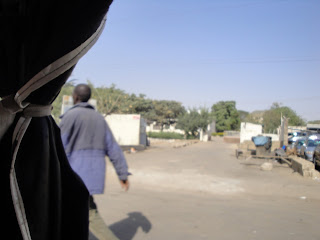
To begin this series and to set the
tone for the fourth one, I will like to remind you of the definition of grief.
Wikipedia.org defines grief as, ‘a multi-faceted response to loss, particularly
to the loss of someone or something to which a bond was formed.’ Put in other
words, grief is the response to loss. This can be the loss of someone or
something we have a connection with. The loss can be of something we cherish
the most. We all agree that we cherish deeply our bodies and parts of our body.
How we cherish our eyes that give us the ability to admire the beauty of God’s
creation on earth! Those who have the ability to see from childhood can’t
imagine the thought of losing it. O, what a loss and yes, what grief it is for
those who lose their ability to see on account of a disease condition or an
accident. Think about our legs. How often we take them for granted, yet how
important they are to our bodies! We move around with it to attend to our needs.
We run with them either as a form of exercise or when we are in a hurry or more
crucially, we use our legs to run from danger. Hence, it is not hard to imagine
how devastating it is for an able-bodied individual to lose the legs or the
ability to walk either due to an accident or a severe illness. That is why in
this series and the next, I will talk about individuals who lost their eyesight
and their ability to walk and how they responded to such loss.
Wikipedia.org
goes on to explain, ‘Although conventionally focused on the emotional response
to loss, (grief) also has physical, cognitive, behavioral, social, and
philosophical dimensions.’ What this means is when we suffer a loss and we
grieve, our response to the loss (grief) is not only emotional. Grief is not
all about mourning which involves the outward expression of grief and in many
cultures that would involve wearing black clothes and sullen appearances,
weeping or been isolated from any social event or contact. No, grief is a lot
more than the acts of mourning. While mourning has to do with expressing sorrow
over the death of someone, grief deals with loss of someone or something.
Mourning is like a subset of grief. Grief encompasses the various ways people
respond to loss and that response can involve physical or behavioural changes,
and/or changes in social interactions. It also involves cognitive (i.e. mental
processes or intelligence) or philosophical (i.e. rational thinking or
reasoning) adaptations as a result of loss. Wikipedia.org explains that the
Kubler-Ross model which describes the five stages of grief (denial, anger,
bargaining, depression, and acceptance) can occur when an individual is
diagnosed with a terminal illness or is enduring a catastrophic loss. Thus, one
who loses one of the senses of the body (like the sense of hearing, seeing,
etc) or a bodily function (like the ability to walk, talk, and others) can
suffer all or some of the stages of grief. At this stage, let me continue with
my series:
In
Their Grief, They Found a Course – The Story of Louis Braille!
Louis
Braille was born in a small town near Paris, France on the 4th of January, 1809.
At the age of 3 while playing with tools in his father’s workshop, one of his
eyes was accidentally struck by a sharp object. Even with the treatment he got,
the wound got infected and the other eye was affected as well and at the age of
5, he became completely blind in both eyes. In spite of the loss of sight, with
the help of his parents and others, he learnt how to live with his blindness.
He had a bright and creative mind and was thus encouraged to seek higher
education. On account of his intelligence and hard work, he was allowed to
attend the National Institute for the Blind Youth in Paris. While in the school, himself and other
students were taught how to read using a cumbersome system called the Hauy
system which was invented by the founder of the school, Valentin Hauy. Hauy was
not blind and the system he designed was more suited for those who were
sighted. Louis Braille who was blind knew too well about the limitations of the
Hauy system. All the same, he persevered in using it. He worked so hard and
after completing the school’s curriculum, he was employed as a teacher’s aide
in the school. Later at the age of 24, he was made a full Professor at the
Institute where he taught history, geometry, and algebra. Because of his sharp
sense of hearing, he also developed interest in music and later became an accomplished
cellist and organist.
From a
young age, he had felt the need to develop a simple means by which the blind
can communicate with others by reading and writing. At the age of 12, he came
across a French Army captain who had developed a system called ‘night writing’.
It’s a list of codes which can be felt with the fingers and soldiers in the
battle field use it to communicate without using a light source or talking.
Finding the ‘night writing’ system too complex for the blind, but inspired by
it, Braille worked relentlessly to develop his own system. At the age of 15, he
had almost completed the system which formed the basis of reading and writing
for the blind: the Braille system, which was named after him. He also adapted
the system to write musical notes. Unfortunately, his system was not adopted in
the Blind Institute where he taught for most of his life until 2 years after
his death. He died in 1852 at the age of 43 due to complications of a
respiratory disease, likely Tuberculosis. So, the system he designed only
gained the much-deserved recognition after his death. Today, the Braille system
is a household name in the world of the blind and beyond. He lost his sight at
the age of 5, but he and his parents did not cower to that loss! He worked hard
to make a difference. In his loss and grief, he found a course. I have a friend
who is blind but he knows how to read and write in Braille. It’s always a thing
of great joy to see him reading in Braille with his fingers. That would not
have been possible without the life course taken by young Louis Braille. He’s
noted for saying:
"Access
to communication in the widest sense is access to knowledge, and that is
vitally important for us if we [the blind] are not to go on being despised or
patronized by condescending sighted people. We do not need pity, nor do we need
to be reminded we are vulnerable. We must be treated as equals – and
communication is the way this can be brought about.” – Wikipedia.org
(Specifics
of the above story were sought from Wikipedia.org)
P.S. I
wrote this piece a few days after the unfortunate crash of the Dana Airlines
plane in Lagos
on the 3rd of June, 2012. - Dr. Eugene A. O






